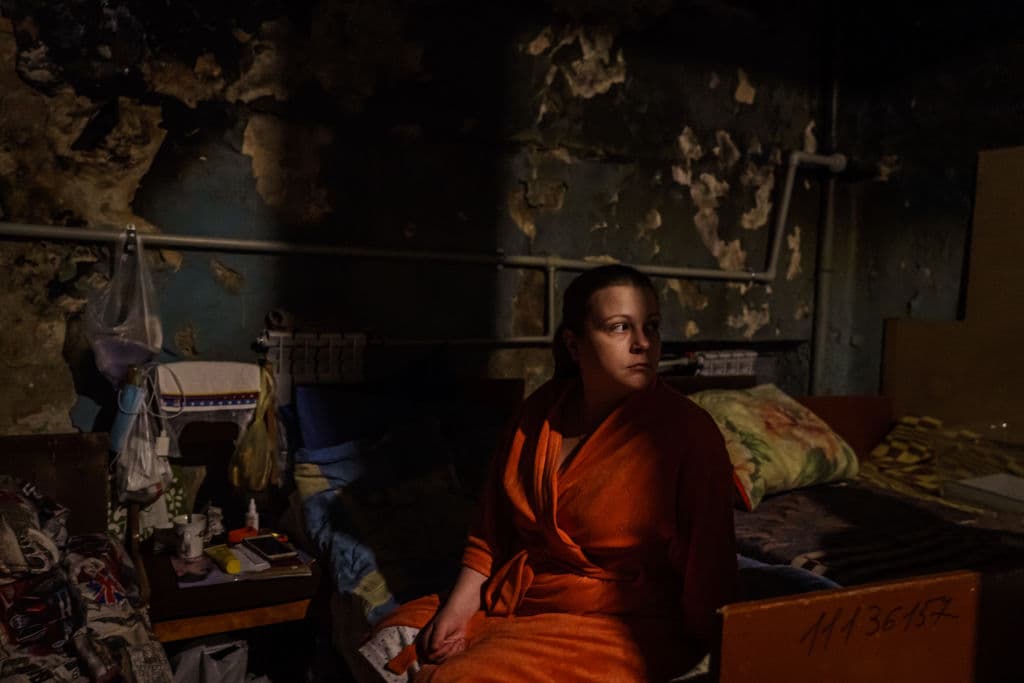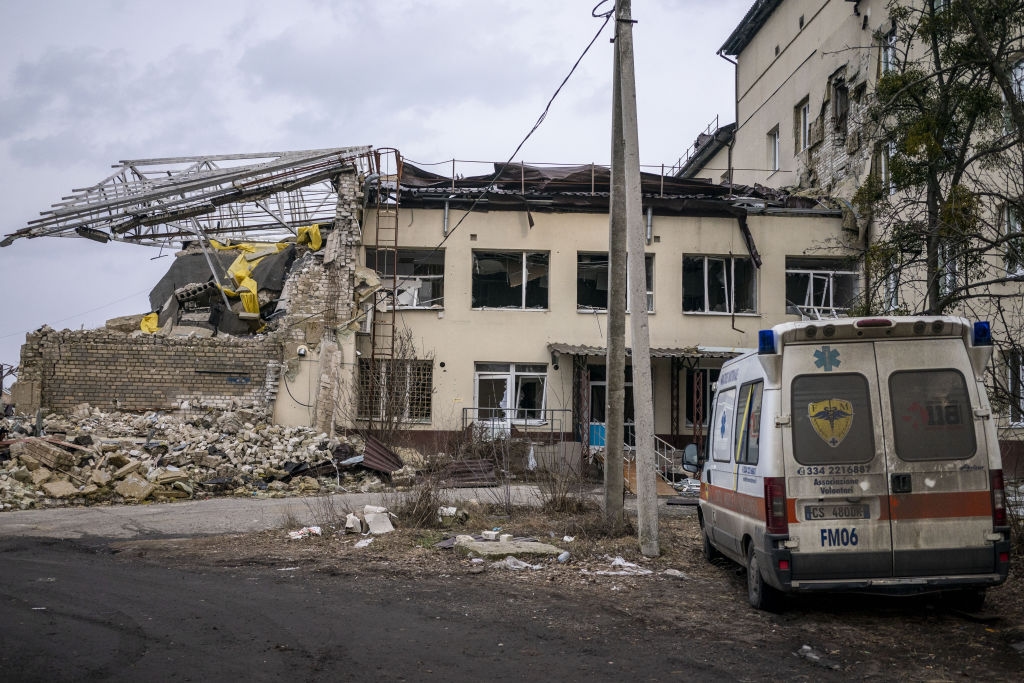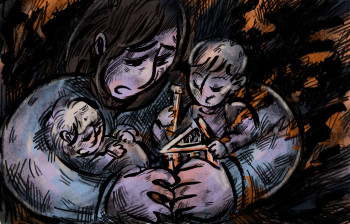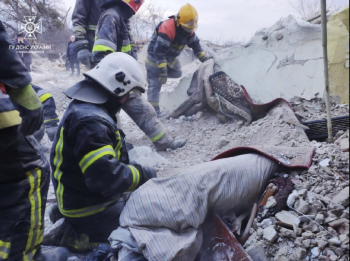Pavlo Kovtoniuk: Russian troops in Ukraine act as if international law does not exist

Editor’s Note: March 9, 2023, marks one year since Russian forces bombed a maternity hospital in Mariupol, killing at least five people and injuring at least 17. The opinions expressed in the op-ed section are those of the authors and do not purport to reflect the views of the Kyiv Independent.
Once a Soviet industrial giant, Mariupol became one of Ukraine’s most vibrant cities – a home for creative industries and festivals by the seaside.
It has become a symbol of the brutality of Russia’s full-scale war against Ukraine, where Russian forces have sacrificed civilian lives on a massive scale to achieve military aims.
Russian troops have not only violated international law but have acted as though it does not exist.
On March 9, 2022, a Russian pilot made a sortie to drop heavy unguided bombs on a residential area in Mariupol.
That the pilot knew it was a residential area is clear – the target was located in the very city center. Most likely, the pilot also knew the site was a hospital.
After the attack, Russian officials didn’t deny it. They instead made unsubstantiated claims that there were Ukrainian military personnel inside the hospital. However, there were only medics and patients.
The world was appalled by images of a pregnant woman being carried out of the maternity hospital amid the destruction caused by the bombing.
This attack wasn’t the first of its kind, and it was not the last.
Days before the Mariupol maternity hospital was destroyed, a Russian pilot dropped more heavy unguided bombs on central Chernihiv. The attack destroyed a cardiac hospital and hit residential buildings, killing 47 people.
The day before the Mariupol tragedy, a Russian aerial bomb hit the intensive care unit of the Izium City Central Hospital, again in a residential area in the city center.
A week after the strike on the maternity hospital, Russian pilots dropped a bomb on Mariupol’s drama theater – just within a five-minute walk from the hospital – killing hundreds of civilians.

Rescuers carry a pregnant woman out of a maternity hospital in Mariupol, Donetsk Oblast, which was bombed on March 9, 2022, by Russian forces. The woman and her unborn child did not survive the attack. (Photo: Evgeniy Maloletka via Instagram)
These crimes are no coincidence.
The attacks reveal a murderous pattern reflecting Russian strategy in Ukraine – Russia’s war is waged against Ukraine's military, as well as its civilian population.
Such a strategy could not emerge from the random decisions of individual field commanders. It reflects a policy developed and supported at the highest political level.
In a speech on Dec. 8, 2022, Russian President Vladimir Putin admitted to targeting civilian infrastructure.
“Yes, we are doing this,” he said.
Long before this acknowledgment, Russian troops were systematically destroying all sorts of civilian infrastructure and committing massive war crimes. That there was a deliberate policy to ruin Mariupol’s healthcare infrastructure, alongside other civilian infrastructure, can be understood from the incredible scale of destruction.
An analysis of satellite and OSINT data by the Ukrainian Healthcare Center (UHC) revealed that it only took about a month for Russia’s military to destroy or severely damage eight out of 10 healthcare facilities in Mariupol, a city with a pre-war population of over 400,000 residents.
Russian troops bombed Mariupol’s only psychiatric hospital, four out of five of the city’s hospitals providing care to mothers and children, five out of six general hospitals, and around three-quarters of the city’s primary care clinics.
In the two districts where Russian troops first broke into the city, over 90% of the healthcare infrastructure was destroyed.
Unlike the maternity hospital, most of the damaged healthcare facilities were not targeted separately. They were ruined in a deliberate carpet-bombing campaign of large residential areas, turning the lively city center into a ghost town.
The fate of the remaining hospitals was no better.
In early April, Russian forces forcibly deported the staff and patients at Mariupol City Hospital No. 4 to Russian-occupied territories in Ukraine.
“Armed men came to the medical facility and gave an ultimatum that doctors and patients had to go out and get into the occupiers’ vehicles,” the Mariupol City Council reported on April 7, 2022.
In late March, the same incident happened at Mariupol City Hospital No. 1 and Maternity Hospital No. 2.
Crimes against healthcare infrastructure are part of a broader vicious pattern.
Mass killings, the destruction of civilian livelihoods, large-scale deportations, enforced disappearances, and other inhumane acts have accompanied these attacks. Russia has deliberately turned Mariupol into a place where living is unbearable.
However, almost a quarter of the population stayed in the city.
Those remaining are mostly people who could not leave – the elderly, chronically ill, or people with limited mobility. Deprived of enough food, clean water, plumbing, and heating, they are barely able to survive.
The remnants of the surviving healthcare facilities have been unable to support the city’s growing health crisis.
Many people have dropped out of their treatments for chronic health conditions due to a lack of necessary drugs. Mounting mental health problems remain entirely unmet. Many people are unable to access a doctor either because there are too few or because they cannot get to one. Many emerging life-threatening conditions are either underdiagnosed or undertreated. In the summer of 2022, Mariupol residents lived on the brink of an epidemic of infectious diseases.
The lack of care has contributed to the city’s immense death toll.
In addition to thousands of killings, estimates indicate that many more people have died from a lack of proper nutrition, sanitation, essential medical care, and untreated wounds. Residents have been buried by their neighbors in makeshift graves in playgrounds, streets, and parks.

A view of Izium City Central Hospital in Izium, Kharkiv Oblast, which was destroyed following Russian attacks on March 8, 2022. (Photo: Jose Colon/Anadolu Agency via Getty Images)
After World War II, a specific term emerged to describe deliberate crimes conducted with such brutality and scale.
According to the United Nations, “crimes against humanity” are distinct from “random, accidental, or isolated acts of violence” and reflect a “methodical type of violence.” They must be “committed in furtherance of a State or organizational policy.”
The destruction of Ukrainian healthcare infrastructure by Russia should be investigated as a separate component of Russian crimes against humanity in Ukraine. The destruction of healthcare facilities in Mariupol is a prime example of why.
Like other notorious perpetrators of crimes against humanity – Nazi leadership, Saddam Hussein, and Slobodan Milošević – Putin and his accomplices have most likely never put their murderous plans and policies on paper.
However, this is not necessary to investigate them. International law says that a policy that leads to crimes against humanity can be “inferred from the totality of the circumstances.” The destruction of Mariupol and its healthcare system provides more than enough evidence.
Unfortunately, the story unfolds further in Bucha, Irpin, Izium, and Sievierodonetsk, as well as other Ukrainian cities and towns where over 250 hospitals were ruined in an attempt to merge the taking of civilian lives with warfare.












